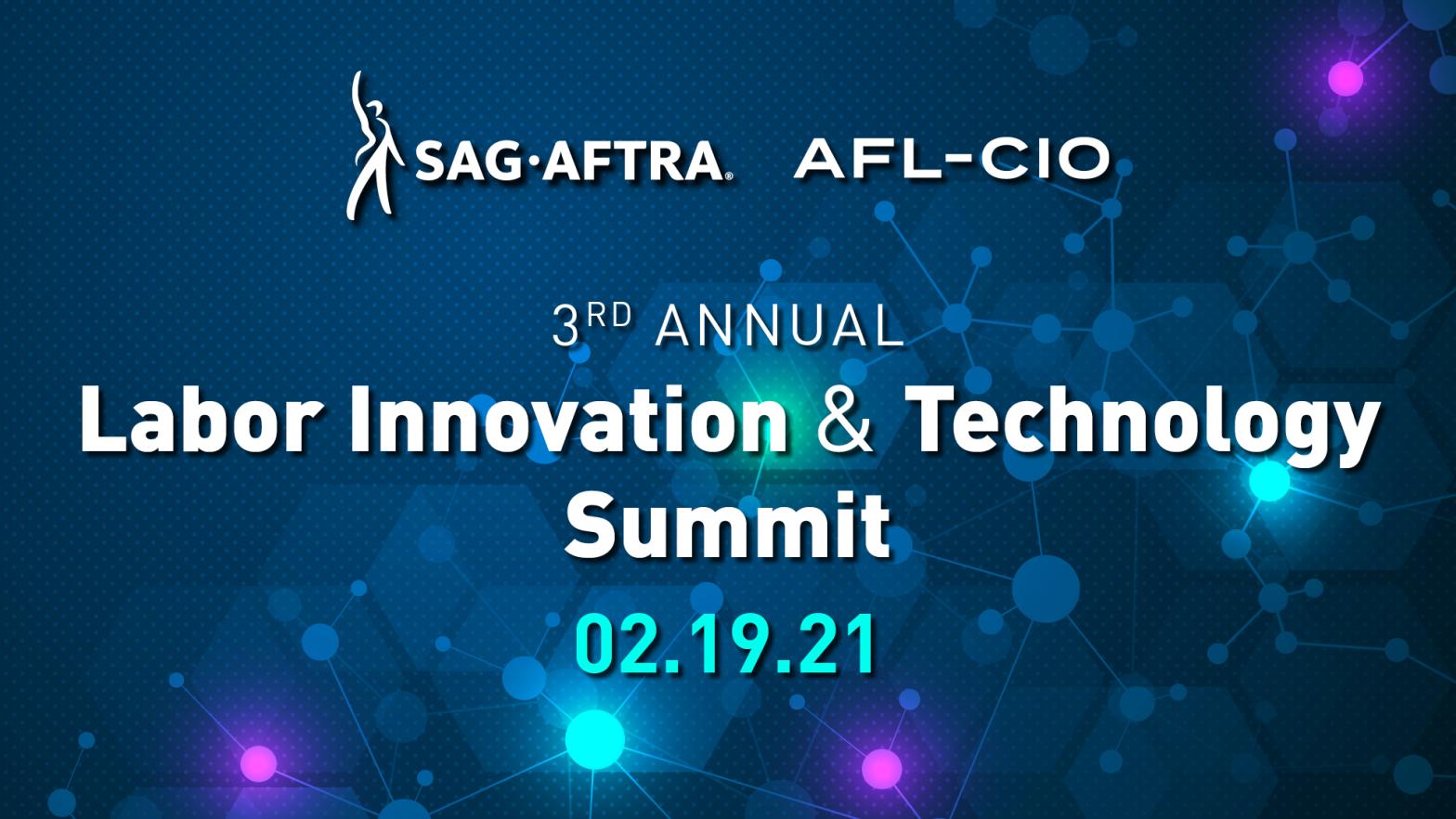
People Around the World Joined Social Dilemma’s Tristan Harris, AFT President Randi Weingarten, AFL-CIO’s Liz Shuler in Daylong Event

3rd Annual Labor Innovation & Technology Summit 2021
Los Angeles — Today, leaders in the labor, entertainment and technology sectors joined together at the Third Annual SAG-AFTRA and AFL-CIO Labor Innovation & Technology Summit in a series of keynote speeches, panel discussions, and one-on-one conversations to discuss the future of innovation and work. The summit included a conversation between SAG-AFTRA President Gabrielle Carteris and Tristan Harris, co-founder and president of the Center for Humane Technology, about the place of the attention economy and humane technology in the future of work.
Some of the other notable speakers from today’s event included:
- David White, National Executive Director, SAG-AFTRA
- Liz Shuler, Secretary-Treasurer, AFL-CIO
- Bonnie Castillo, Executive Director, National Nurses United
- Marc Perrone, International President, United Food and Commercial Workers International Union
- Randi Weingarten, President, American Federation of Teachers
SAG-AFTRA members and others around the country tuned in for panel discussions on streaming and the entertainment industry’s changing business models, volumetric video, unions’ roles in the future of work and much more.
“Technology is meant to serve humanity, not surpass it,” said Carteris. “The underlying theme of today: The role of unions is not to stop technology, but to harness and shape it. We have to develop the laws that put fences around technology. By fences, I mean standards that are very clear about how, as technology evolves, humans are treated fairly, can make a decent living and can do their jobs with dignity and respect.”
“Increasingly, a handful of private companies are dominating the shape of the market,” said White. “We’re now moving away from the principles that were established in the 20th century as a result of good government oversight.”
“How do we make sure the technology isn’t controlling us but that we’re controlling the technology?” asked Harris. “We have to understand the way it has been controlling us if we have a hope of controlling it.”
“The labor movement has always been the vehicle for turning technological advances into better living standards and wages,” said Liz Shuler. Shuler also noted that companies are weaponizing data for union busting.
“The only way to ensure that tech serves patients over profit is to build power in our workplaces,” said Castillo.
“If we don’t confront some of the ownership or corporate power that has taken over our country, we are going to have more and more haves and have-nots,” said Perrone.
“We know how to make things safe when we prioritize them,” said Weingarten. “But what has happened here is that we have not prioritized essential workers even though they’re doing essential work.”
SAG-AFTRA is working to protect its members’ livelihoods in a rapidly changing economy. In February 2020, the Motion Picture Association estimated that the film and television industry directly employed 892,000 people. Since March, more than 186,000 performing arts, spectator sports and related industry jobs have been lost — 36% of the industry’s pre-pandemic workforce. This has threatened artists’ economic security; according to a survey conducted by Americans for the Arts, many artists’ top needs are unemployment insurance and food and housing assistance.
Last week, SAG-AFTRA announced a plan to create more work opportunities for SAG-AFTRA members by offering an influencer agreement. The new agreement covers content creators and influencers — popular content creators who have monetized their social media following through sponsored content and advertising. The influencer marketing industry is on track to be worth up to $15 billion by 2022, up from $8 billion in 2019.
SAG-AFTRA has led the charge on providing worker protections as the performing arts acclimates to streaming industry disruptors. In 2019, White brokered the first agreement between a union and a global streaming service -- Netflix. This agreement became especially crucial during the pandemic. In 2020, United States subscribers to major streaming services increased by more than 50%. The bargaining agreements between unions and these technological companies will be key to protecting artists’ livelihoods.
About SAG-AFTRA
SAG-AFTRA represents approximately 160,000 actors, announcers, broadcast journalists, dancers, DJs, news writers, news editors, program hosts, puppeteers, recording artists, singers, stunt performers, voiceover artists and other entertainment and media professionals. SAG-AFTRA members are the faces and voices that entertain and inform America and the world. A proud affiliate of the AFL-CIO, SAG-AFTRA has national offices in Los Angeles and New York and local offices nationwide representing members working together to secure the strongest protections for entertainment and media artists into the 21st century and beyond. Visit SAG-AFTRA online at SAGAFTRA.org.
News
- Tags:
- News Updates
- Press Releases
